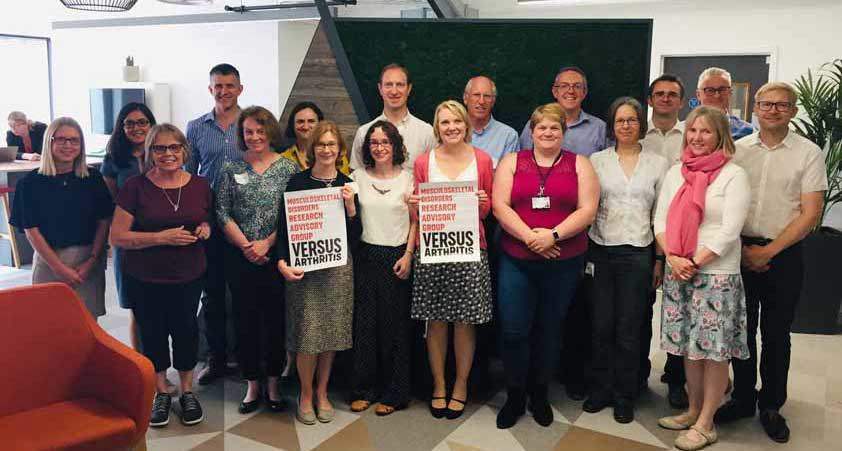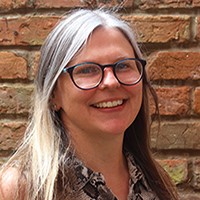About The Musculoskeletal Disorders Research Advisory Group

The Musculoskeletal Disorders Research Advisory Group works to improve the quality and impact of research which seeks to develop our understanding and management of musculoskeletal disorders.
Musculoskeletal (MSK) disorders are conditions which involve joints, bone, ligaments, muscles, nerves or tendons, which together make up the MSK system. Many of these conditions cause pain and limited mobility, which can have a significant impact on quality of life. More research in these areas is urgently needed to help improve the lives of people living with MSK conditions.
The Musculoskeletal Disorders Research Advisory Group first met in July 2019 and seeks to link patients, researchers, and healthcare professionals with funders or other agencies who influence the funding and research strategy of MSK conditions. With this group, we hope to communicate the importance, priority and need for research into MSK disorders with other organisations that fund or influence MSK research.
This group aims to be inclusive of all MSKmusculoskeletal disorders except those already included by the Autoimmune Disorders and Inflammatory Arthritis Research Advisory Groups.
Conditions this group cover include, but are not limited to:
- Osteoarthritis
- Crystal diseases (such as gout).
- Regional and widespread musculoskeletal pain (e.g. back pain, shoulder pain and tendinopathy; fibromyalgia).
- Metabolic bone disorders (e.g. osteoporosis and rare bone diseases).
- Management and treatment of septic arthritis.
- Musculoskeletal injuries caused by acute traumatic events.
Group Lead – Dr Zoe Paskins

Zoe is an Honorary Consultant Rheumatologist at the Haywood Metabolic Bone Centre in Stoke-on-Trent and Reader in Rheumatology at the Primary Care Centre Versus Arthritis at Keele University. She is Clinical Lead of the Haywood Metabolic Bone Centre which includes the North Staffordshire Fracture Liaison and DXA service.
She also leads the Keele osteoporosis research group with specific interests in primary care management of osteoporosis and clinician-patient communication, holding an NIHR Clinician Scientist Award to develop and evaluate a decision support tool in osteoporosis.
Musculoskeletal Research Advisory Group membership
- Dr Zoe Paskins. Reader in Rheumatology, Keele University and Honorary Consultant Rheumatologist
- Amanda Clark. Versus Arthritis Research Partner
- Jane Taylor-Wormald. Versus Arthritis Research Partner
- Professor George Peat. Professor of Clinical Epidemiology, Keele University
- Professor Richard Jones. Professor of Clinical Biomechanics, University of Salford
- Professor Ruth Wilcox. Professor of Biomedical Engineering, University of Leeds
- Dr Stephen Richardson. Senior Lecturer, Division of Cell Matrix Biology & Regenerative Medicine, The University of Manchester
- Professor Christine Le Maitre. Professor of Cell Biology and Tissue Regeneration, Sheffield Hallam University
- Dr Linda Troeberg. Associate Professor, University of East Anglia
- Professor Hemant Pandit. Professor of Orthopaedics and Honorary Consultant, University of Leeds and Leeds Teaching Hospitals NHS Trust
- Dr David Andersson. Reader in Neuroscience, King's College London
- Professor Debbie Mason. Director of Pre-Clinical Research - Cardiff University
- Professor Neal Millar. Professor of Orthopaedic Surgery and Musculoskeletal Science, University of Glasgow
- Professor Emma Clark. Professor of Clinical Musculoskeletal Epidemiology, University of Bristol
- Dr Emma Salt. Consultant Physiotherapist, University Hospitals of Derby and Burton NHS Foundation Trust
- Dr Felicity Bishop. Associate Professor (Psychology), University of Southampton
- Dr Elspeth Wise. General Practitioner, South Shields (Newcastle)
- Dr Maura McCarron. Rheumatologist, Belfast Health and Social Care Trust
- Professor Abhishek Abhishek. Consultant Rheumatologist (Crystal Diseases) – University of Nottingham
- Professor Nidhi Sofat. Consultant Rheumatologist – St George’s, University of London
- Dr Benjamin Faber. NIHR Academic Clinical Lecturer in Rheumatology – University of Bristol
- Dr Andrew Sturrock. Pharmacist – Northumbria University
- Dr Matthew Seah. Trainee Surgeon – University of Cambridge
- Dr Martin Thomas. Senior Research Fellow in Clinical Epidemiology – Keele University
Paediatric Rheumatology Clinical Study Group Representative
Victoria Harbottle, Paediatric Physiotherapist- Great North Children's Hospital, Newcastle Upon Tyne.
Research Priorities for Musculoskeletal Disorders
In 2020-21, the Musculoskeletal Disorders Research Advisory Group conducted a national priority setting exercise to identify the most important areas to research relating to MSK disorders. This was published in The Lancet Rheumatology.
What we did
The research prioritisation exercise involved four stages and two surveys which were completed during 2020-2021. We:
- gathered 1260 unanswered questions using an e-survey (213 responders).
- summarised unanswered questions into 68 broad research areas.
- used a second e-survey to score these research areas on importance and impact (285 responders).
- used the end results to rank the priorities.
Responders identified themselves as either a member of the public, a researcher or healthcare professional (HCP). Slightly more people identified as members of the public for both surveys than researchers or HCPs. We had similar numbers of researchers and HCPs.
What we identified
The top three priorities, in order:
- To develop and test new treatments to prevent or reduce progression of MSK conditions.
- To identify the best ways to manage pain and/or improve quality of life.
- 23 areas of equal importance ranked third in priority. A summary of these areas is below:
- Improving disease prevention, early, accurate diagnosis and prediction.
- Understanding how diseases progress and the underpinning disease processes, and using this knowledge to improve tests and treatments.
- Understanding how to better implement, personalise, target, combine and monitor treatments, including surgery, exercise and self-management.
Musculoskeletal Disorders Research Advisory Group Activities
The Musculoskeletal Disorders Research Advisory Group spent the first three years establishing the current state of play with respect to MSK disorders research and conducting the priority setting exercise listed above. We contributed to the gaps and opportunities document which informed the Versus Arthritis research strategy.
Future planned activities include forums to identify how we can support the research community to make progress with the number one research priority, overcome barriers to research translation and promote public and patient participation in research.
We will advertise forum opportunities here and by email when available.
Information for people with musculoskeletal disorders
If you have a musculoskeletal condition and want to get involved with research you can:
- get involved with our research here at Versus Arthritis
- find out about other opportunities via the National Institute for Health and Care Research.
Information for researchers interested in musculoskeletal disorders
We’ve compiled a list of resources which we think might be helpful to researchers when they are writing grant applications and publications, and designing their research for maximum patient impact:
Contact us
To contact the MSK Disorders RAG please contact group administrator please email Jay Tavernor
For further information about current vacancies, please see our News for Researchers page.